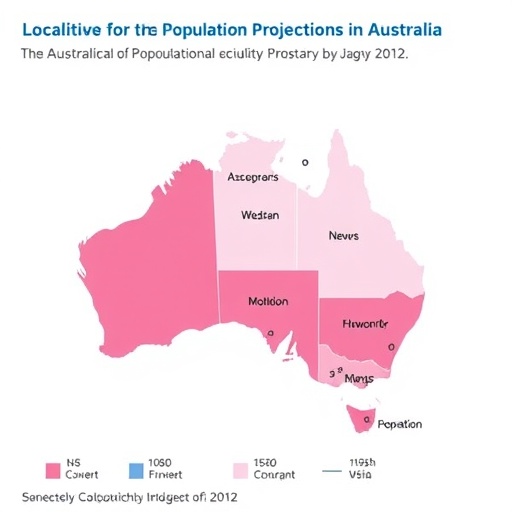In a groundbreaking study published in the Journal of Population Research, researchers led by Temple, Grossman, and Wilson have undertaken an ambitious project aimed at forecasting the population living with dementia at a granular local area scale throughout Australia. This research holds significant implications, as the prevalence of dementia is on the rise, with profound effects on healthcare systems, community support networks, and the broader society. As global life expectancy increases, the urgency to understand dementia trends has never been more critical.
Dementia is a complex neurological condition that affects millions worldwide. The World Health Organization has reported an alarming increase in dementia cases, projecting that by 2030, there will be over 75 million people affected globally. Australia’s demographic landscape is no exception to this trend. As we progress further into the 21st century, the need for localized data analysis becomes essential. The researchers’ approach focuses on providing detailed projections to inform policy decisions and resource allocations.
The study utilizes sophisticated statistical methodologies to estimate the current and future population of individuals living with dementia in various Australian locales. By employing demographic modeling techniques, the team has crafted a comprehensive framework that takes into account varying risk factors, underlying health conditions, and demographic shifts. This nuanced approach allows for projections that are not only robust but also tailored to the needs of specific communities.
A key component of this research is the incorporation of geographic information systems (GIS). By mapping data onto specific regional boundaries, the researchers can visualize the distribution of dementia within the population effectively. This spatial analysis is critical, as dementia does not affect the population uniformly. Rather, certain areas may exhibit higher prevalence rates due to socioeconomic factors, access to healthcare resources, and educational support systems. Understanding these geographic disparities is vital for developing targeted interventions.
Furthermore, the research illuminates the potential economic burden that dementia poses on Australian society. As the population ages, healthcare costs associated with dementia care are projected to escalate. By providing concrete estimates of dementia prevalence, decision-makers can develop strategies to allocate funding more efficiently for elder care programs, home care services, and community outreach initiatives. The researchers advocate for a multidisciplinary approach that involves collaboration between healthcare providers, policymakers, and community organizations to ensure adequate service delivery.
Testing the validity of these projections through empirical data remains a central tenet of the research project. The authors emphasize the importance of cross-referencing their estimates with existing datasets from health organizations and national surveys. This rigorous validation process ensures that the findings are not only data-driven but also actionable. Stakeholders can rely on these estimates to make informed decisions about future healthcare budgets and resource distribution based on empirical evidence.
In addition to their projections, the research includes a thorough examination of the risk factors associated with dementia. The authors draw attention to the role of lifestyle choices, genetic predispositions, and environmental influences in the development of the condition. They stress the importance of preventive measures, which can significantly reduce the incidence of dementia in future generations. Public health campaigns that encourage physical activity, mental stimulation, and social interactions are crucial components of this prevention strategy.
The implications of this research extend beyond mere statistical estimates; they resonate within the emotional fabric of families and communities affected by dementia. The authors underscore the importance of awareness and education surrounding the condition. Misconceptions about dementia often lead to stigma and social isolation for those afflicted and their caregivers. By disseminating information garnered from their research, the team hopes to foster a more empathetic society that is better equipped to support individuals living with dementia.
As the study draws attention to the future landscape of dementia in Australia, it also serves as a call to action for further research. The authors encourage additional studies that explore innovative care models, community-based support systems, and emerging therapeutic interventions. The more knowledge we acquire about dementia and its complexity, the better we can equip ourselves to confront this multifaceted challenge.
In conclusion, the research undertaken by Temple, Grossman, and Wilson heralds a new chapter in our understanding of dementia at a local scale in Australia. Their meticulous approach to estimating and projecting dementia prevalence embodies the intersection of data science and public health. As we stand at the precipice of an aging society, this research highlights the importance of preparedness, education, and community support in addressing the challenges posed by dementia.
The trajectory of dementia research, particularly in localized contexts, is crucial for shaping effective public policy and enhancing the quality of life for those affected. As their findings circulate within academic and healthcare institutions, the researchers remain hopeful that their work will prompt conversations among stakeholders and inspire collaborative efforts in combating this pervasive and devastating condition.
By igniting dialogue centered on dementia, this study paves the way for a more informed and compassionate response—one that honors the dignity of individuals living with dementia and embraces the challenge of creating supportive environments for all.
Subject of Research: Estimating and projecting the population living with dementia at the local area scale in Australia
Article Title: Estimating and projecting the population living with dementia at the local area scale in Australia
Article References:
Temple, J., Grossman, I., Wilson, T. et al. Estimating and projecting the population living with dementia at the local area scale in Australia.
J Pop Research 42, 37 (2025). https://doi.org/10.1007/s12546-025-09389-8
Image Credits: AI Generated
DOI: 10.1007/s12546-025-09389-8
Keywords: Dementia, population projections, Australia, public health, geographic information systems, healthcare policy, risk factors.




